Lena Dunham on Her First Film in a Decade, Youthful Blind Spots and Hope to Reboot ‘Girls’
- Oops!Something went wrong.Please try again later.
- Oops!Something went wrong.Please try again later.

It was early 2020, and Lena Dunham was living in London, excitedly preparing to make her first feature film since her 2010 breakout Tiny Furniture. She had moved to the city temporarily in the summer of 2019 to direct the pilot for the HBO series Industry and loved it so much, she stayed. The film she was prepping, an adaptation of her favorite childhood book, Catherine, Called Birdy, was about a 13-year-old English girl coming of age in 1190 A.D.
Dunham bought the rights shortly after she’d shot to fame as the creator and star of HBO’s Girls. “People were like, ‘What do you want to option?’ They were throwing all these wild best-sellers at me,” recalls Dunham, 35. “I was like, ‘I’d really like to option this YA novel about a medieval girl getting her period.'”
More from The Hollywood Reporter
Amy Schumer Broke Into a Boys' Club. Now She Wants to Blow It Up.
Sundance Institute Taps Adam Piron to Lead Indigenous Program
Paul Dano on His Terrifying Batman Villain and Why He's No Longer Scared of Going Hollywood
Twenty days before filming was set to begin, the mushrooming COVID-19 pandemic forced Catherine, Called Birdy to shut down (it would not resume filming for 17 months). “A week after that, I got COVID,” says Dunham, adding that the virus had an intense impact on her health. Dunham suffers from a connective tissue disorder known as Ehlers-Danlos syndrome (EDS) that, she says, could have led to potentially fatal complications.
All of this unfolded after Dunham had emerged from the darkest period of her life. A “50-car pileup,” is how she puts it. It began during the final season of Girls in 2016, when the pressures of churning out the hit series while being cudgeled daily on social media and in the press — taking hits for everything from her looks to her many well-documented PR gaffes — finally cracked her foundations. The right was calling her a child molester (based on a revelation in her 2014 memoir that at age 7 she’d examined her baby sibling’s genitals); the left was calling her a traitor (for defending Girls writer/executive producer Murray Miller against an accusation of rape, which he denied — and which Dunham later walked back and apologized for). And she was falling apart.
“Those images of me at the last Girls premiere, skinny and hollow-eyed, that was 100 percent my appetite and my body just shutting down in response to that,” she says.
After Girls aired its final episode on April 16, 2017, things got worse. Having spent the majority of her 20s laser-focused on the watercooler series that made her a household name, Dunham suddenly found herself staring into a creative abyss, fearing that she may have peaked too soon.
In 2018, she underwent a hysterectomy to relieve the excruciating pain of endometriosis, a condition in which menstrual tissue grows outside the uterus; broke up with her longtime boyfriend, pop hitmaker Jack Antonoff; entered rehab for an addiction to benzodiazepines, specifically Klonopin; and dissolved her creative partnership (and close friendship) with Girls co-showrunner Jenni Konner.
COVID-19 easily could have been the final nail. But a funny thing happened on the way to the apocalypse: Dunham found that the isolation actually was a boon to her creativity and state of mind. It was almost as if she had been training for this moment her entire life.
“I have always been by nature what I call a ‘bed creature,'” she explains during one of several Zoom conversations. Dunham is seated on the floor of her parents’ New York City home in a deeply cut V-neck sweater, a leopard print headband atop her hair. Her husband, Peruvian-British musician Luis Felber — whom mutual friends set her up with in January 2021 and whom she married eight months later — occasionally appears in the doorway behind her.
Continues Dunham, “I’ve gotten used to the idea that there are times when my body’s not going to work for me and the only thing that I’m going to have is books and writing and my relationship to my work and making art.”
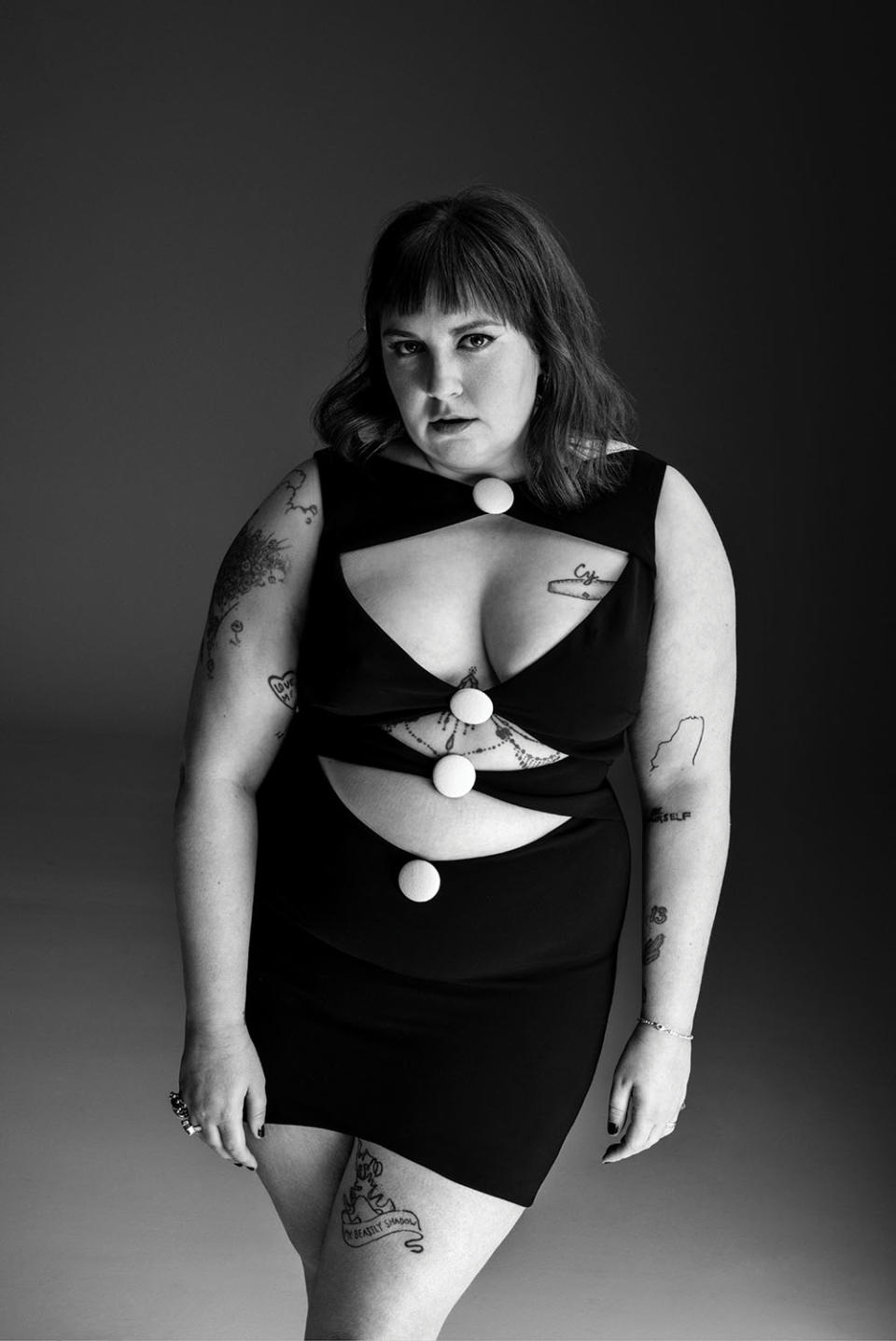
Photographed by Lia Clay Miller
***
In April 2020, the pandemic having fully set in, Dunham hopped a flight from London to Los Angeles and crashed at a friend’s house in Silver Lake. Her rescue dog, a Mexican hairless pug named Ingrid, was her constant companion. She then decided to make L.A. her home for a while. She rented a place in a “bougie mobile home park in Malibu” where she drove a golf cart to the local market and chatted with her retiree neighbors.
Dunham passed those early days of the pandemic gorging herself on a certain type of movie — mostly from the 1970s (“I’ve always felt very ’70s — it was the era of the casual nipple”) and revolving around a specific breed of complicated, sexually liberated women. “Belle de Jour, A Woman Under the Influence, Remember My Name, An Unmarried Woman. Basically every performance Gena Rowlands has ever given,” she says. “And I was thinking, ‘There has to be room for something like this.'”
It was within this odd podlike environment — steeped in feminist period cinema, grieving the loss of her own uterus and ability to carry children while avoiding the deadly virus just outside — that Sharp Stick emerged, fully formed, from Dunham’s subconscious.
“My dad called it a ‘sexual fable,'” she says of her new film, which stars Kristine Froseth as Sarah Jo, a 26-year-old woman whose carnal development is interrupted by a hysterectomy at age 17. When Sarah Jo, a babysitter, loses her virginity to her employer (played by Jon Bernthal), it unleashes within her something wild, alien and wonderful.
“It was about trying to understand the impact [my hysterectomy] had on me,” Dunham says. “It was about processing my life. And then, obviously, it becomes about the characters — and not about you at all.”
Dunham plays Bernthal’s harried, 9-months-pregnant wife in the film, which also stars Jennifer Jason Leigh and Taylour Paige. Employing an all-female crew, Sharp Stick shot in secret in L.A.’s Atwater Village and Eagle Rock in early 2021. “There was a good energy all around,” says Froseth, 26, of the locked set. “We had an amazing intimacy coordinator. Everything was choreographed — no surprises.” It is one of the buzzier titles set to premiere at this year’s Sundance, which was forced to go online-only due to the spread of the omicron variant. The film, financed by FilmNation Entertainment, will premiere virtually Jan. 22.
“There are many greater tragedies than me not getting to see my movie premiere,” says Dunham. “But I was so excited for my cast to get to see it together. We did it on such a small scale, and everyone really brought everything to it. It was such a harkening back to how I started. But we’re planning a Zoom party. I guess people Zoomed into my wedding — and they’ll Zoom into my premiere.”
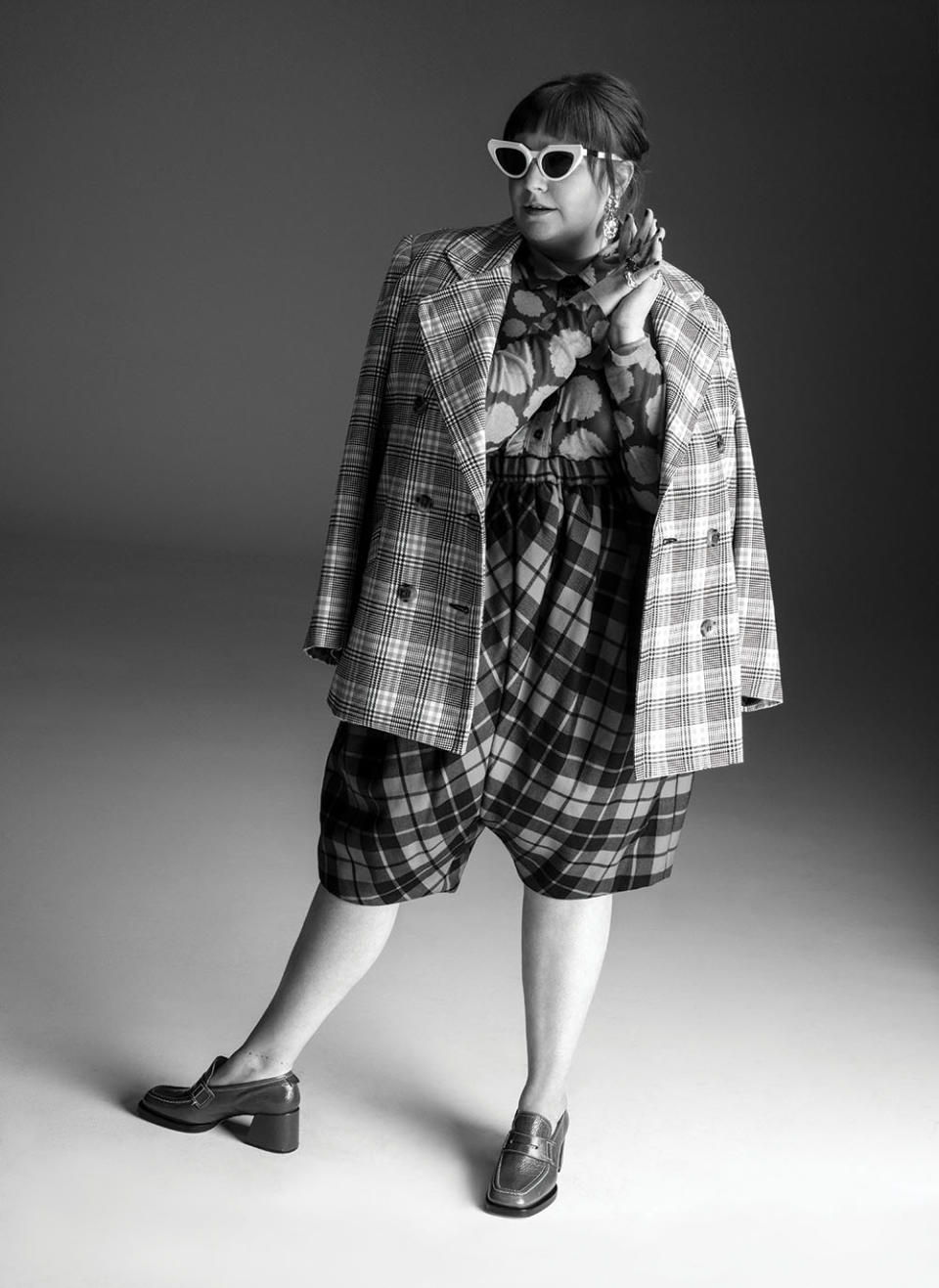
Photographed by Lia Clay Miller
***
If you’ve seen and heard less from Dunham lately — her only significant acting role in the past five years was a small but memorable one as a Manson Family member in Quentin Tarantino’s 2019 film Once Upon a Time in Hollywood — that’s entirely by design.
“I just realized that the experience of Girls and my 20s was such an all-encompassing hurricane of both validation and derision that in order for me to keep that place of myself that loved to make art, that was what needed to happen,” she says of her self-imposed exile.
Dunham has been such a dominant fixture of the pop-culture landscape for so long now — covering Vogue, strutting alongside Taylor Swift’s squad, grabbing headlines for a litany of stumbles and overshares — that it’s almost difficult to recall a moment when she wasn’t. She insists she had never planned or even wanted to be famous. “I wasn’t some teenager who was like, ‘I’m going to be a TV star,'” she says. “I was a weird theater and poetry kid. I literally thought I was going to be a film teacher at my old high school and make experimental movies on the side.”
By now, the Lena Dunham origin story is practically the stuff of Hollywood legend. Raised in a Tribeca loft to successful artist parents — Carroll Dunham, a painter, and Laurie Simmons, a photographer — she led a privileged and culture-rich upbringing. At Oberlin College, she immersed herself in mumblecore-style filmmaking. By 23, she’d won the narrative feature prize at South by Southwest for Tiny Furniture, which featured her mother and sibling Cyrus, who came out as transgender in 2019, as fictional counterparts.
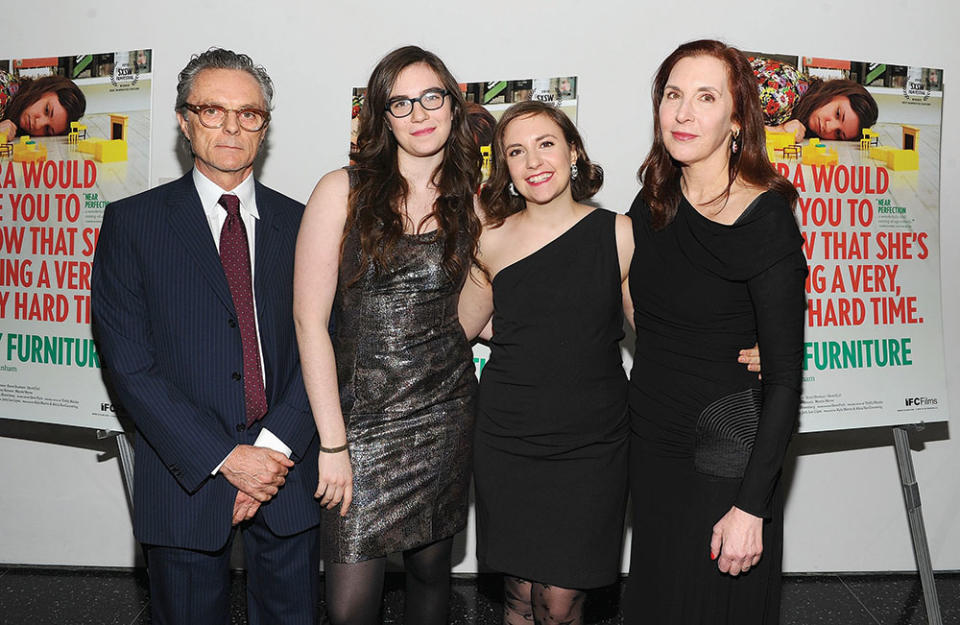
Jamie McCarthy/WireImage
By 24, she was profiled in The New Yorker and The New York Times. The author of the latter story, late media critic David Carr, introduced the film to Judd Apatow, who instantly declared himself a fan and joined forces with Dunham and Konner (who’d been paired with her by then-HBO head Sue Naegle) to create a showcase series around Dunham’s prodigious talents. Girls was given a green light at HBO in early 2011 — with Dunham achieving by 25 what most aspiring writer-actor-directors never see in a lifetime.
“Her ability to connect the personal with the universal has always been a special talent of hers,” says Casey Bloys, chief content officer of HBO and HBO Max, where Dunham has an overall deal under her production shingle, Good Thing Going. “She’s also a great producer and mentor, and she is always impactful on projects even where she’s not the central creative voice.”
For Dunham, the seismic shock of that massive early success still hasn’t quite worn off. She gets teary-eyed remembering the first time she walked onto the Girls set. “I look back, and just, like, the sheer gall of me, stepping onto set that first day; 24-year-old me standing in Silver Cup Studios, the old Sex and the City studios, going, ‘Let’s do this.’ I’m proud of myself.”
Speaking of Sex and the City, Dunham has been loving the divisive reboot, And Just Like That. “It was such a pleasure to see those women back together and to see them take on middle-age sexuality,” she says. “For me, those are women who can do no wrong.” Dunham isn’t averse to trying something similar with Girls and even has engaged in informal talks with HBO about getting the gang back together for an older and wiser version of the quintessential millennial series. (Women?)
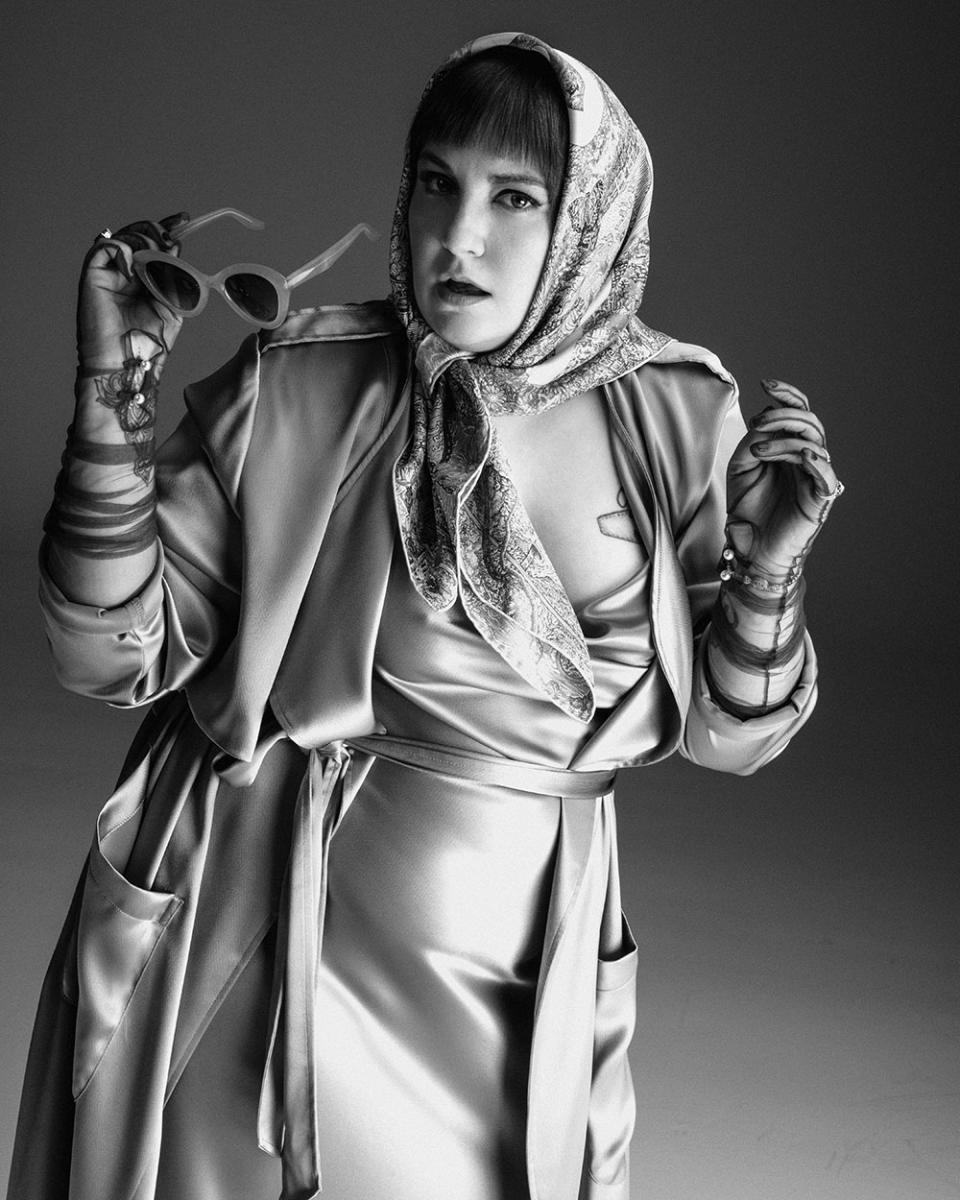
Photographed by Lia Clay Miller
Where HBO is concerned, Bloys says: “As proud of the show as we are, there aren’t any plans to bring Girls back. It’s great to know new viewers will continue to discover the [original] series.” Adds Dunham: “We all recognize it’s not time yet. I want it to be at a moment when the characters’ lives have really changed. Right now, everyone would just be wanting to see Kylo Ren.”
There was no way for Dunham to know that when a 27-year-old Adam Driver ambled into a Girls audition, she was about to help launch a future Star Wars villain and all-around movie star. She just knew Driver had something that the other actors did not.
“The part in the script was described like Taylor Kitsch, kind of a golden-haired God,” she recalls. “And Adam is intensely striking and charismatic, but that’s not how you would describe him. He just gave the most astonishing, strange audition.” The character was meant to be a first-season love interest before Dunham’s character, Hannah Horvath, went out into the world. Instead, he became a beloved fixture spanning all six seasons. The two stars have not been good about keeping in touch. “Not for any sort of dark reason,” offers Dunham. “If I saw him, I’d be delighted.”
Many people wrongly assume Dunham is Hannah Horvath — that the “messy lunatic” character, as she puts it, is simply a heightened version of herself. But the prototypical Girls image of Hannah awkwardly holding a beer in ill-fitting shorts, looking for love in all the wrong Williamsburg dive bars — that was happening all around Dunham, it just wasn’t happening to her. “It’s almost like I took the few nights of my life that I went wild — got wasted, threw up — and expanded them into six years,” she says. “I was definitely much more of a millennial documenter than I was present in my millennial life.”
She can count on one hand the times she felt she indulged in anything resembling a Hollywood fast lane. One was the night she won a Golden Globe in 2013. She left the HBO party at 10:45 p.m. Another was a meal with P. Diddy at Soho House. “It was a 7 p.m. dinner,” she says. “I think people imagined there was a lot more jets and sex wildness that came along with the show — but I was always working. I was on set all day. When I wasn’t on set, I was editing or in the writers room.” At the peak of Girls mania, she was typically spending quiet evenings at home with Antonoff and her family. The rest of it — save for a lunch with Mike Nichols here, a compliment from Ben Affleck at a party there — “was a blur.”
What’s less of a blur, however, was the virulent hostility Dunham seemed to evoke from the moment Girls hit the air — and which still hasn’t let up, more than a decade later. “People had a very swift and strong and allergic reaction to what I looked like, and they made it very clear to me,” Dunham says. “I was getting messages — many, many, many of them a day — about what I looked like. Things most people will never have said to them in their lives because most of polite society keeps people from walking up to each other at a Target and going like, ‘You’re fat, you’re ugly and you deserve to die.'”
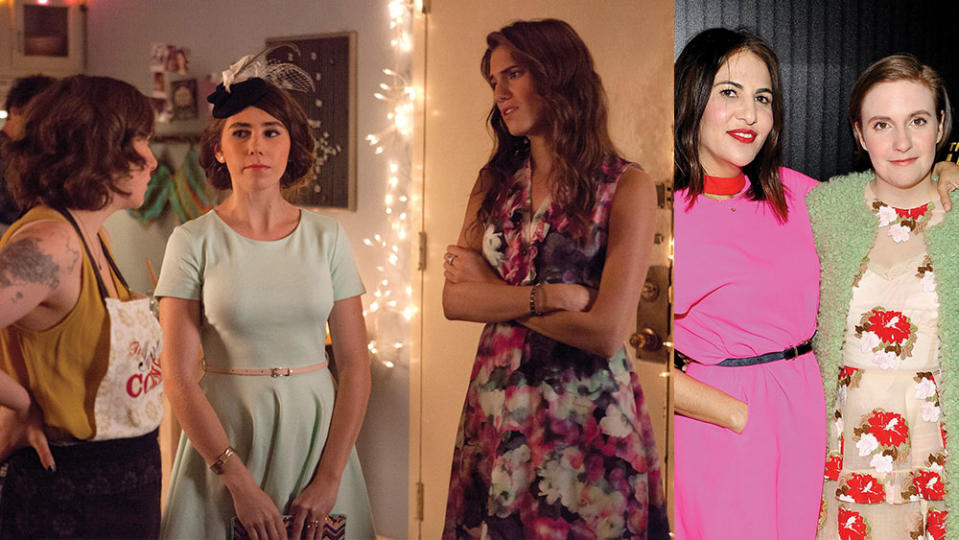
Courtesy of HBO; D Dipasupil/FilmMagic
She estimates half of the messages came from women. “I think people would think it would be like Trump-loving men in the heartland,” she says. “But it was women. Probably women with similar body types to me who had internalized the kind of hatred that we are supposed to have of our bodies. If they weren’t going to enjoy their body, then I sure as hell wasn’t supposed to enjoy mine.”
Dunham had never set out to craft a statement about body positivity. “People thought I had been raised a nudist or something,” she says of her frequent nakedness on the show. “It’s like, no, it was a decision about who this character was, the way that I wanted the sex scenes to look and feel, how we were using them in the story. I had all the issues with my body that every young woman has. I just happened to not be self-conscious naked.”
She told herself at the time that she could maintain a healthy distance from the constant onslaught of hate. But the truth was, she couldn’t. Dunham was first prescribed Klonopin at 12. As the stress of her career built up, a simmering, baseline anxiety set in. She started leaning more and more on Klonopin just to function.
“I’ve been through a lot of hard things in my adulthood. Getting off Klonopin was probably the hardest,” she says. Now Dunham is completely sober — no wine, no pot, no pills (save for some non-psychoactive medications). “If I know that I’m a person who can go too far in a time of psychological stress,” she reasons, “then why not eliminate that possibility?”
Her first Girls follow-up, the 2018 HBO series Camping, a Jennifer Garner comedy, was poorly reviewed and would mark her final collaboration with Konner. Dunham left mid-production to enter rehab; when she emerged, the two parted ways.
Asked whether the timing was more than coincidental, Dunham responds, “I think my recovery played a part in the break with Jenni insofar as it showed me that I needed to pause and clear the slate. I needed to almost start again and just hear my own voice.” (Konner did not respond to a request for comment.) The disappointing experience on Camping, she continues, “was a reminder to me that to make things that really were truthful to me, I needed to go back to a kind of quieter place.”

Courtesy of HBO
***
When Dunham completed her script for Sharp Stick, she sent it out to her dream cast. Bernthal had been her first choice to play her philandering husband, a hunky stay-at-home L.A. dad whose streetwear company never quite succeeded. He was an easy sell: They had previously met in London and hit it off. “We spent the entire night in her bathroom, smoking cigarettes and talking about everything,” says Bernthal. “I would follow her anywhere.”
Also on her wish list was Leigh for Sarah Jo’s mom, a Hollywood burnout who manages an apartment building. Leigh loved the script and jumped at the opportunity to work with Dunham. “She’s incredibly genuine,” says Leigh. “She brings that out in everyone. You could meet her and in three minutes you’re telling her the deepest secrets you have.”
But when Dunham offered the role of Sarah Jo’s adopted sister to Paige, the Zola star wasn’t sure how to feel. “If I’m being honest,” says Paige, “I was like, ‘Don’t you think this character was written as a white person?'” Paige had never watched Girls, but she was aware of Dunham and of the criticisms that her show lacked people of color on both sides of the camera. Her fear was that she was only being approached in an attempt to diversify the cast.
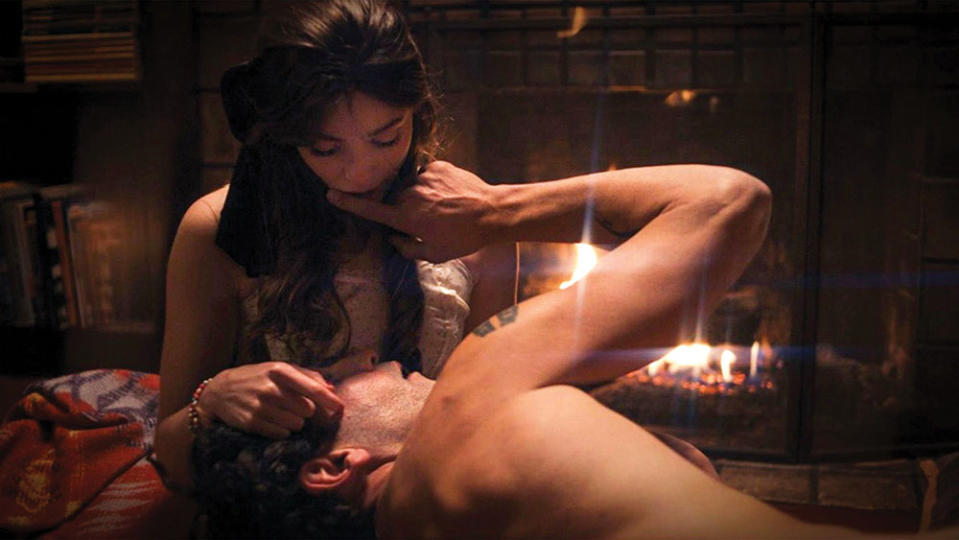
Courtesy of Sundance Institute
Dunham convinced Paige that couldn’t have been further from the truth — that she had in fact written the part with her in mind. And so Paige agreed to play Sarah Jo’s sister, a character who posts sexy videos to social media, at times whipping her long, blond braids in slow motion (Dunham’s idea). It’s a definite risk for Dunham, who opens herself up to criticisms of stereotyping Black women or worse. As Dunham explains it, each of the women are supposed to represent the “three-way mirror of female experience.”
Whatever hesitations Paige had quickly evaporated the moment she stepped foot on set. “She was so kind,” she says of Dunham. “So open. She wants to be better. She wants to do better. She wants to listen. She wants to engage. She has a really great attitude even when she’s dealing with illnesses. She was just a pleasant surprise of love. I hate cancel culture. I wish there was redemption culture.”
Dunham is acutely aware that with regard to matters of race, she will be observed more closely, and judged more harshly, than any of her contemporaries. She’s also aware that she shoulders the blame for that.
“There are things I said in my 20s and 30s that I apologized for because I knew they came from a place of ignorance and lack of awareness,” Dunham says. (One example of many: when she told a journalist, “No one would be calling me a racist if they knew how badly I wanted to fuck Drake.”)
“But,” she says, “I was young, and I had huge blind spots. I came right at the cusp of the internet becoming a thing. The speed with which the hammer comes down is so much more intense right now. I am not one of those people who creates a binary between wokeness and good art — because I really like the fact that we live in a moment where people whose voices have historically been marginalized can speak out through the tool of the internet.
“At the same time,” she continues, “I have a huge amount of empathy for people who make mistakes. There came a point where I was sort of apologizing for breathing. That waters down the meaning of the words. I’d love the next decade to be less about apologizing and just about openly making art.”
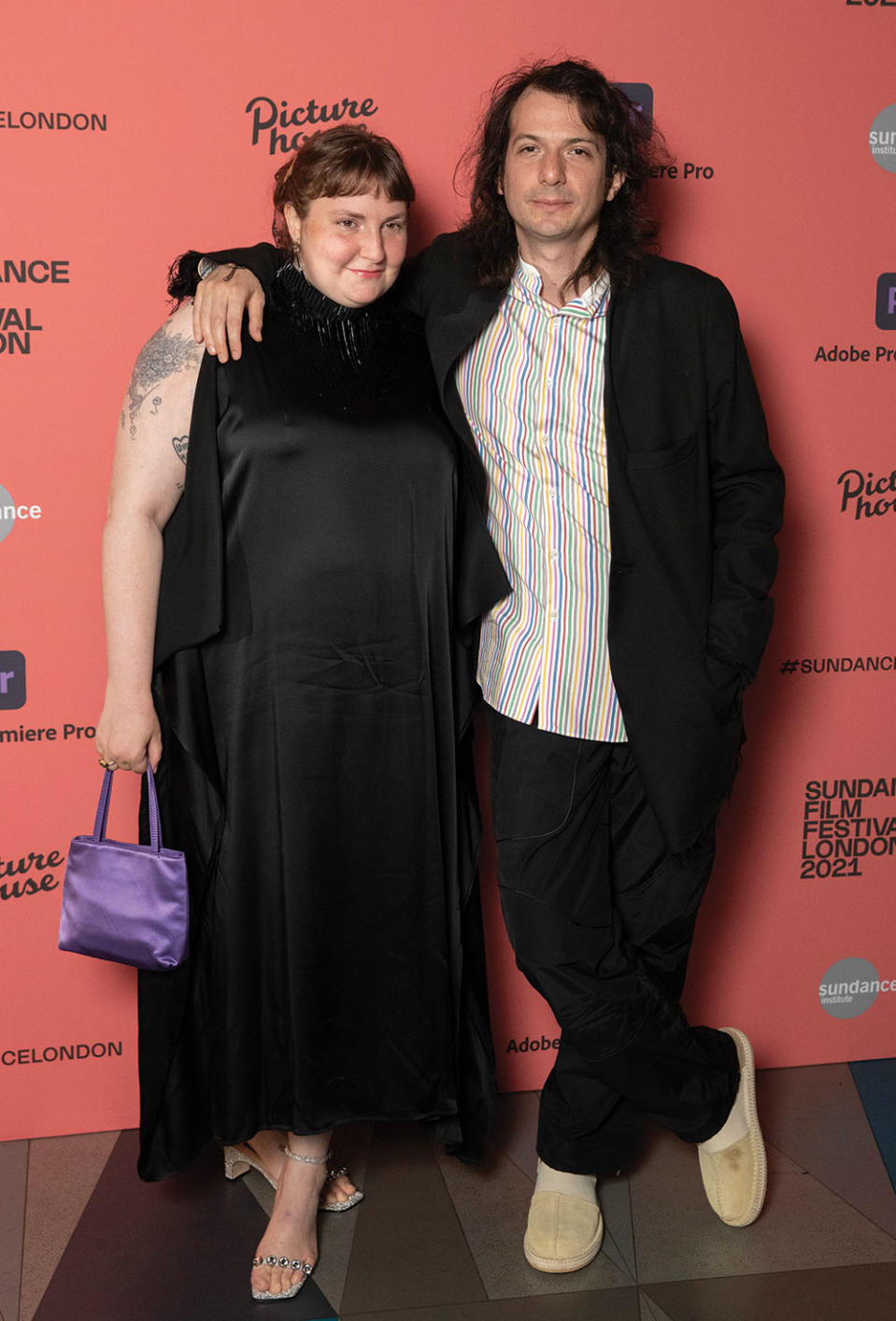
John Phillips/Getty Images
About a month after Sharp Stick wrapped, Dunham returned to London to finish making her dream film, Catherine, Called Birdy, for Amazon and Working Title. (She splits her time now among London, New York and her parents’ property in Connecticut, where she built a small house.)
Catherine wrapped in May — meaning Dunham could have two features out by year’s end. She’s also writing Mob Queens with Dennis Lehane, an HBO limited-series crime drama based on a podcast. (Ruth Wilson is attached to play Anna Genovese, wife of Mafia boss Gino Genovese.) And for the past three years, she’s been plugging away at a second memoir — this one conceived as a kind of field guide for aspiring women auteurs.
There’s one more project in the works: Dunham wants to adopt. Since meeting Felber, she has eased up on the timeline. Dunham was not looking for a partner when she met him; she was, in fact, in the midst of a mostly celibate two-year stretch and had resigned herself to a life of singledom. Now they’re rarely apart. She’s directed music videos for him; he scored Sharp Stick for her. “I’ll be 36 this year,” she says. “I don’t feel like turning 38 without a child.”
Dunham pauses to slurp down some pho noodles and take a swig of cucumber water, which her husband has brought her. “It was like the last four years I’d been building a boat and now was my time to sail it and see if it sunk or not,” she says. “And I was like, ‘Oh. It holds up on the water.'”
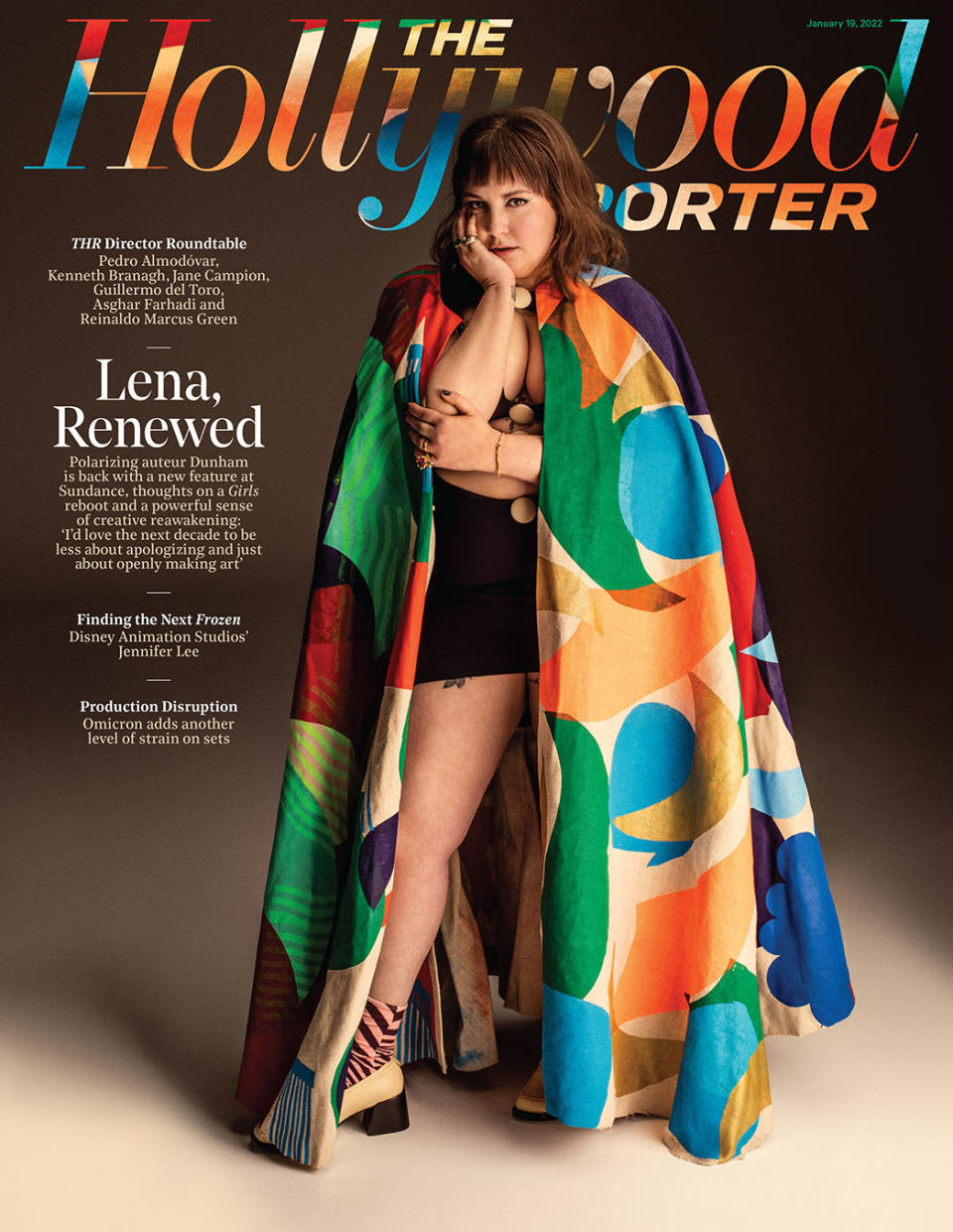
Photographed by Lia Clay Miller
This story first appeared in the Jan. 19 issue of The Hollywood Reporter magazine. Click here to subscribe.
Best of The Hollywood Reporter

